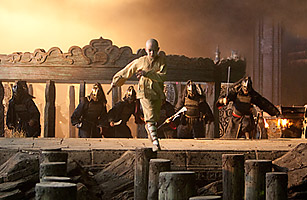
Noah Ringer as Aang, center, in a scene from The Last Airbender
Asian Americans, I hear your agitation. For the past few weeks, you and your allies in ethnic correctness have clogged the blogosphere with complaints about the casting in M. Night Shyamalan's live-action movie version of the Nickelodeon animated series Avatar: The Last Airbender. Yes, the main villain roles among the rapacious Fire People are played by men of Indian descent (as is Shyamalan). Yes, Aang, the show's Chinese hero, is played by a Caucasian boy named Noah Ringer; and two other pasty white kids, Nicola Peltz and Jackson Rathbone, were chosen to impersonate Aang's main pals, Katara and Sokka. Actually, the actors who voice the Asian roles in the TV series are Caucasian too — but never mind that, because, yes again, it's a shame the film's producers couldn't find suitable Chinese youngsters among the 500 million or so on earth.
You can relax, bloggers. The dearth of racially appropriate casting in the U.S. simply means that fewer Asians were humiliated by appearing in what is surely the worst botch of a fantasy epic since Ralph Bakshi's animated desecration of The Lord of the Rings back in 1978. The actors who didn't get to be in The Last Airbender are like the passengers who arrived too late to catch the final flight of the Hindenburg.
Oh, the humanity! Where is it in this movie? The lack of vitality and even surface plausibility numbs the senses. Actors wander through sets, speak their lines and battle computer-generated beasts without ever convincing the viewer that they are the characters they're playing, let alone that these characters are worth investing an evening in. Shyamalan and his team have devised a fantasy environment that's both bland and murky; it's not a world that rewards the search for visual grandeur or eccentricity. The dialogue he wrote has the stilted sagacity of a fortune-cookie dictum; after each line is delivered, you may be tempted to shout out, "In bed!" The movie's lavish scale is matched by its amateur-hour naiveté — as if a Wall Street plutocrat had spent millions on a monumental pageant for his 10-year-old daughter's birthday party, then staged it himself on his country estate and invited his neighbors and their kids to play the leads. (Shyamalan shot most of this $150 million movie near his suburban Philadelphia home; it's the most expensive film ever made in the Philly area.)
Like its source TV show, dreamed up by Michael Dante DiMartino and Bryan Konietzko, Airbender posits a world divided into four nations by its elements: Earth, Air, Water and Fire. The planet manages a certain harmony because each group has strengths — "bending" capabilities — that counter those of the others. (Is there another planet where the ruling tribes are Rock, Paper and Scissors?) But lately the Fire People have made war on the others, whose only hope is in the prophecy of a savior: an avatar who has mastered all four elements. That would be Aang, a child with a sacred blue arrow tattooed on his bald scalp. One problem, though: ages ago, back in Messiah school, he played hooky during the earth-, wind- and fire-bending classes. He must learn these skills quickly, before Prince Zuko the Fireboy (Dev Patel of Slumdog Millionaire) and his devious adviser, Commander Zhao (Aasif Mandvi, senior Asian correspondent on The Daily Show), dare I say, Rule the World. Insert evil laugh here.
One word in the TV show's title — Avatar — reminds you, by its absence, what The Last Airbender is missing. Shyamalan has none of James Cameron's gift for building a cohesive, compelling fantasy from scratch. Cameron's Avatar has a density of imagination, suggesting that the filmmakers thought out every aspect of Pandora, within the audience's field of vision and beyond it. Airbender settles for a limited vision and stodgy attitude. The promise of fabulous martial-arts scenes goes unrealized; there's no great kung-fu fighting here. It happens that Ringer is the junior tae kwon do champion of Texas, but the movie uses his athleticism mainly to strike balletic poses, as if he wants to be not the Karate Kid but Billy Elliot.
Ringer, despite eerily resembling a pint-size version of TIME book critic and fantasy author Lev Grossman, is utterly bereft of charisma. He's the inert center of a dead movie. But then good actors often give subpar performances in Shyamalan films (Sigourney Weaver in The Village, Paul Giamatti in Lady in the Water, Zooey Deschanel in The Happening), making me suspect the fault is with the director. Maybe he needed stars like Bruce Willis (in The Sixth Sense and Unbreakable) and Mel Gibson (in Signs) to link their gravitas to his solemnity.
That was always Shyamalan's distinction: in a terminally frivolous era, he's just about the last serious guy making Hollywood-style movies. "For me," he told TIME's Desa Philadelphia in 2004, "the challenge is taking a B-movie subject like ghosts or aliens or monsters in the woods and treating it with absolute respect and sincerity." In The Sixth Sense and Unbreakable, he wedded that sincerity to a classically austere camera style that helped those early fables of bereavement weave canny spells over the mass audience. But whatever knack he had, he has misplaced, as the level of his movies' achievement has declined from spot-on to near miss to incompetent and clueless.
In his first film adaptation — his most expensive project by far — Shyamalan has hit paper-scissors-rock bottom, and the promise of a sequel at this movie's end feels more like a threat. Please, Hollywood, if there's to be another Airbender movie, hand the job to some efficient hack, and not to a once mesmerizing artist who's lost his way.
